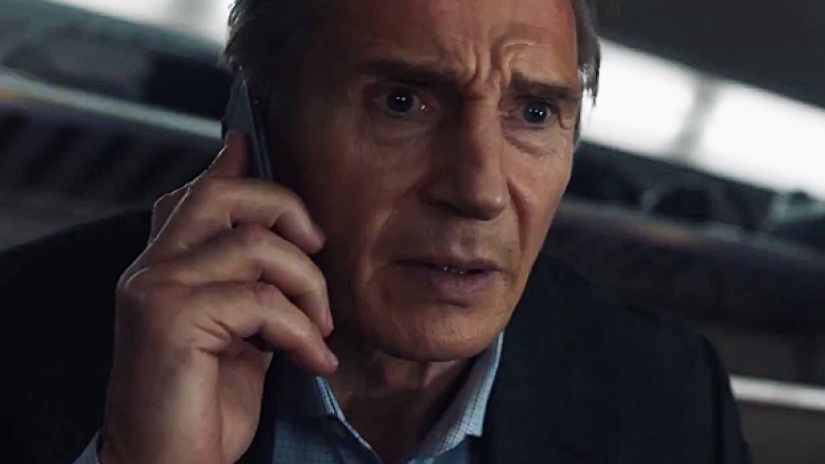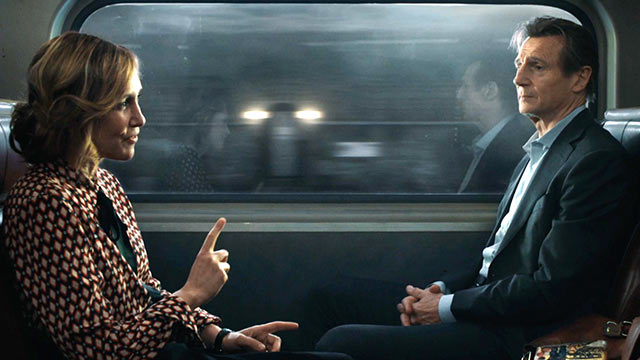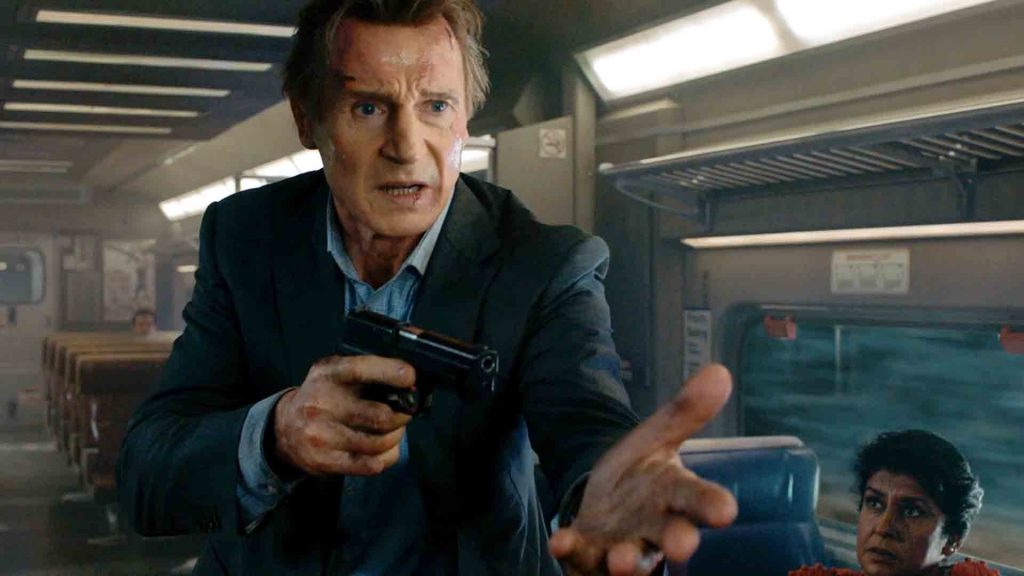This train’s freaking me out.
I have to admit, I’m not the biggest Liam Neeson fan. And by that I specifically mean those Liam Neeson films. The ones that pitch him as some sort of action hero, defiant to the end. It all started way back with Taken (2008), and it seems the decade-long car crash still has momentum, despite all the clickbait articles out there about the sixty five year old’s retirement from action movies. Now, Taken was good. I liked it. But the joy of watching an old man run around scowling and punching humans, wolves, whatever – let’s just say the novelty wore off fast for me.
All Aboard
The latest in the long line of face-punching sweat-a-thon films is The Commuter (2018), directed by long-time Neeson pimp, Jaume Collet-Serra (including Unknown (2011), Non-Stop (2014), Run All Night (2015)), and written by Ryan Engle and first-timers (if IMDb is anything to go by) Bryon Willinger and Philip de Blasi.
Opening in a suburban home somewhere in New York, we are introduced to to Michael MacCauley (Liam Neeson) – a family man living with his wife Karen (Elizabeth McGovern) and son Danny (Dean-Charles Chapman), to whom he is very close. Each morning, Michael wakes up. Gets ready. Wakes up his son. Eats breakfast. Gets dropped off at the train station by his wife. Goes to work. Reset and repeat. Which, I don’t mind pointing out, is what my nightmares are made of.
We see glimpses of his daily commute, and the faces he sees each and every day. When we end up with him at work, we discover Michael is a life insurance salesman in Manhattan, one that is seemingly quite good at his job. Except, well, life moves on. Pulled aside by his boss, Michael is laid off without warning. With only five years until his retirement, he is understandably upset – and soon shoots off to a bar to meet with an old friend, Detective Lieutenant Alex “Murph” Murphy (Patrick Wilson). Murph commiserates with Michael, complaining about how the police force is little more than a game of politics now – with Captain David Hawthorne (Sam Neill) in some way to blame.
An aside here. Why, why, do people insist on forcing motion into every damn shot? During the bar scene, the camera motion was enough to make me feel sick. I think I only noticed it in this particular scene, but please, stop this. We don’t need to have the camera wobble and shake while two Irish men are drinking at a bar. Well. Unless the bar happens to be based in Kabul or on the San Andreas fault, anyway. It just isn’t necessary.
But anyway, still fretting about the life ahead of him – and the awkward conversation he is due to have with his wife – Michael heads out to catch the train home. On the way, his phone is stolen from his jacket, and Michael settles in for a long journey. As he pulls a book from his bag, he is approached by a strange woman going by the name of Joanna (Vera Farmiga). Describing herself as a student of psychology, Joanna proposes a hypothetical situation to Michael. Accepting the test, Michael is asked whether he would complete a simple task that would effect one of the passengers on the train, the consequences of which he would know nothing about, in exchange for a total reward of $100,000.
The task laid out for him is to track down a passenger going by the name, “Prynne”. In their bag, they are supposed to be carrying some stolen property. Michael is to locate Prynne and plant a GPS tracker on the bag before Prynne reaches their destination – which just so happens to be the final destination of the train, Cold Springs.
After Joanna slips off the train, Michael is quick to check the carriage toilet, and discovers the promised $25,000 as a deposit. It is not a hypothetical situation. Panicking, Michael attempts to leave the train, but is abruptly stopped by a young woman, who reveals to him that he is being watched – and shows him his wife’s wedding ring. Things are getting serious.
Michael continues to try and find a way out of his situation, but the seeds are sewn. He is on the case. Scanning the carriages for faces that don’t appear to belong, Michael begins to sweep the train, speaking to some, watching others. For the first time in however many years, Michael is forced to interact with strangers and familiar faces alike, of which there’s a very mixed bag.
With the threat of harm to his wife, Michael contacts Murph using someone’s phone, but this is swiftly punished. Realising he is in an impossible situation, Michael steps up his investigation. It is revealed over time that he was once a police officer himself, having worked with Murph many years ago.
At this point, The Commuter has the sprinklings of a tense Hitchcock tale, with terse conversations and calculated observations allowing the audience to join in on the mystery and try and piece together the same clues. I admit, I really enjoyed the first half. I felt that Liam Neeson was as much the every man as should be expected, but then, things became predictably bad.
It seems that Michael wasn’t just a cop. He was a supercop. Despite years out of the service, and working a sales job in the city where the most exercise his body is taken through is likely the telling of little white salesman lies, he is somehow able to square up against young, fit men. Young, fit men who just happen to also be trained to fight.
And this is only the beginning. The story escalates quicker and faster, Michael goes from being the everyman commuter we all see on our daily routine, to an action hero, through and through. Resisting the orders given to him by Joanne and others, Michael becomes more desperate – alternating between obeying and rebelling, stepping ever closer to the finish line. It was around about here I felt my eyes glaze over. I stopped caring. I knew, then, that whatever happens, Michael would be fine. His family would be fine. There will probably be some sort of twist, then things would resolve themselves.
I was right.
The core conceit is that we are not aware of Michael’s past, which is fine, but I feel like it went a little far. It may have been alright, were it not for Liam Neeson playing the main part – and weighed down with the baggage of a decade of playing the exact same character, in virtually the exact same movie.
What’s more, the story behind Prynne and the reason they were being hunted by Michael and Joanne’s mysterious group of tramps and spies felt very thin on the ground – and had the sense of being an afterthought. This in itself isn’t much of an issue, but once a couple of the puzzle pieces fell into place, there really wasn’t much more room for guessing. It all just seemed so obvious.
I don’t want to seem too down on The Commuter. I enjoyed it for the most part – but what started as a very promising tale of suspicion and paranoia – in an age where we are encouraged to watch for suspicious activity – wound up as just another action-packed film, full of sweaty faces, fist punches and gun shots.
Don’t even talk to me about the ending. Ugh.
So, yeah, watch it if you like Liam Neeson. Watch it if you like a bit of tension. Otherwise, eh. Play Wordscapes instead. It’s great.
Yours, A P Tyler




Comments are closed, but trackbacks and pingbacks are open.